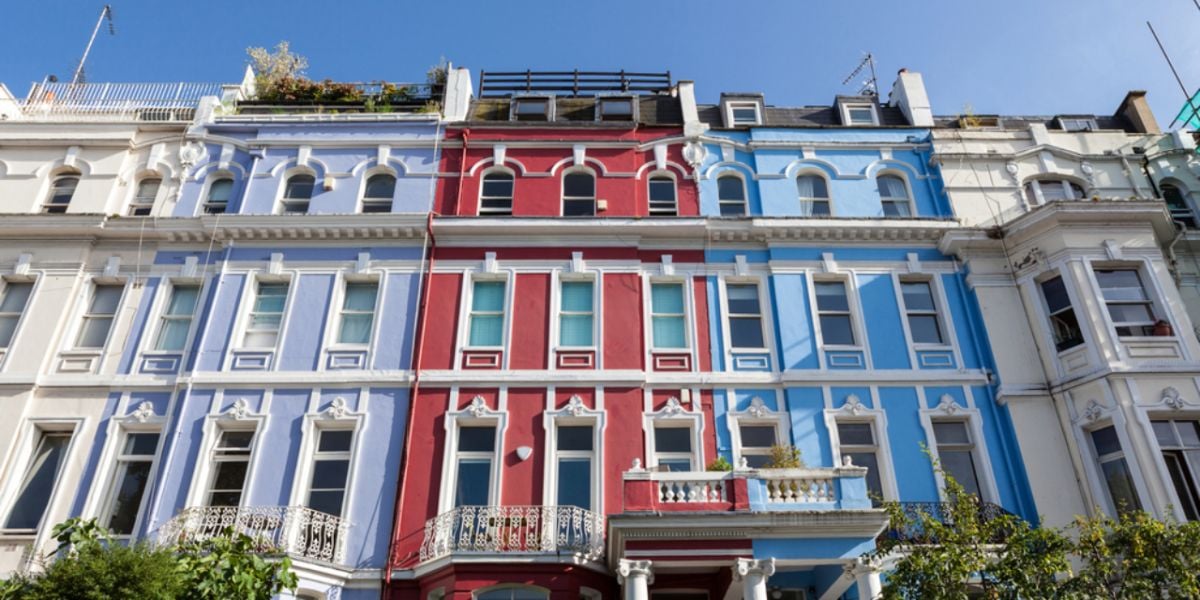
With a surface area of 1,572km² and thirty districts to choose from, London has thousands of homes available for rent and buying. Finding a home in England's capital can be challenging when you are new to the city, but having the correct information can help you make the right decision.
Understanding London's geography and areas
With a surface area of 1,572km² across five main regions (which include thirty districts), London has thousands of homes available for rent and buying.
West London
West London has a reputation for affluent professionals and families and features some of the city's most expensive and desirable areas. Expats love it here thanks to lush parks, iconic architecture and top-notch schools. There are over 60 neighbourhoods in West London, but we've picked some of the best to consider if cost isn't a primary concern.
Kensington and Chelsea
King's Road stretches through Chelsea and Fulham and offers bustling cafés, bars, fashion shops and cultural attractions - including the Saatchi Gallery and historic Curzon cinema. However, transport links from Sloane Square Station are limited for North/South London commutes, and average property prices reach around £2 million in Kensington and Chelsea.
Notting Hill
Notting Hill offers a bohemian atmosphere with vintage shops on Portobello Road and the annual Caribbean carnival. Excellent transport links via Central, Circle and District lines make the area's iconic pastel-coloured houses easily accessible. However, rents are 90% above London average. So, for a similar ambiance at a lower cost, consider Shepherd's Bush or Ealing.
Fulham
Fulham sits close to King's Road and Sloane Square's high-end stores and dining, while offering its own social hub of cafés, eateries and parks. The area hosts Chelsea and Fulham football clubs, causing heavy traffic on match days, but remains relatively safe and peaceful compared to Central London.
Hammersmith
Hammersmith combines urban buzz with riverside tranquility and features shops, restaurants, bars and music venues alongside Thames-side relaxation. Home to international corporations like L'Oreal and Disney, it attracts creative professionals seeking modern apartments. Excellent transport links include District, Piccadilly, Circle and Hammersmith lines, plus a major bus station.
Chiswick
Chiswick attracts affluent families with its safe environment, relaxed pace, green spaces, and reputable primary schools. Central London is easily accessible within 30 minutes when needed. The area offers mansion flats, elegant cottages and large detached houses, many overlooking the Thames.
North London
Similarly, North London offers glamour with fewer designer boutiques than Central London. Green Lanes, one of London's longest streets (10km), features international restaurants and independent shops selling everything from electronics to fresh products. The area comprises six boroughs, housing nearly one million people.
Here's a summary of some of the best places to live in North London that are popular with expats moving here.
Islington
Former overcrowded suburb turned elite neighbourhood, Islington Upper Street features independent shops, trendy boutiques and international restaurants. Excellent connectivity includes some of London's best pubs, with Oxford Circus reachable in seven minutes from Highbury and Islington station. The area houses the Senate House Library, where George Orwell once worked during WWII.
Bloomsbury
This self-contained area features the British Museum, cosy cafés, bookshops, UCL and green spaces. No car is needed here - walk, cycle or tube from nearby stations including Tottenham Court Road, Holborn or King's Cross. Georgian houses and Edwardian mansions (up to £6 million) dominate over modern flats here.
King's Cross
Seven neighbourhoods have formed this major transport hub since 1852 - a title enhanced by the Eurostar terminal. Named after King George IV's statue (demolished in 1845), the area now features reimagined shopping at Coal Drop Yard's converted Victorian viaducts alongside excellent national and international connections.
Camden Town
Famous for its markets (Camden Lock, Buck Street, Stables Market) and live music venues, Camden is the heart of London's music scene. Proud Galleries hosts photography exhibitions, while Regent's Park offers family-friendly activities and the London Zoo. Once a punk meeting point, it now attracts over 25 million tourists annually.
Central London
Home to Parliament, Royal Palaces, major museums and global corporate headquarters - you'll find limited housing and high rents here, which means there are few permanent residents. In fact, it's primarily a work and entertainment district. Below, we pick three of the most popular areas.
The City of London
The Square Mile packs museums, art galleries, bars, restaurants and shops into a small area. Despite having fewer than 10,000 residents, it sees 500,000+ daily commuters. Plans include 1,500 affordable homes by 2030 and a rebrand from finance center to cultural hub focusing on creative industries and bioscience. Residents here also receive Central Congestion Zone discounts.
West End
Don't want to miss out on evening entertainment? This area is London's nightlife and theatre capital and is home to world-class dining and shopping. All underground lines pass through here. The area is also known as the fashionable end of London - from Oxford Street shops to Soho's Carnaby Street boutiques, it's a shopper's paradise.
Covent Garden
Covent Garden's residents are exclusive people who can afford to live in one of London's most touristy and creative spots. Covent Garden is quieter than neighbouring Soho, a fair representation of London's bar and restaurant scene. It's not easy to find a big house here, but there are different types of flats in contemporary blocks and historic buildings. Like all central areas, Covent Garden is linked to the rest of London with tube and bus services, and many favourite places, such as Waterloo and Oxford Street, are within walking distance.
East London
What was once a disadvantaged area of London is now one of the fastest-growing districts in the city - with plenty of popular areas for expats, as you'll see below. The area successfully marries old with the new and attracts visitors to the Queen Elizabeth Olympic Park, Westfield Stratford City as well as in Spitalfields, Shoreditch, Hoxton, Canary Wharf and Mile End.
Hackney
This place is a trendy hub for hipsters and young artists, though this popularity has driven up rents here. While lacking a tube station, Hackney Central and Hackney Downs railway stations connect to Liverpool Street. Crime rates exceed London's average, particularly for bike theft. But a silver lining is that the area offers up 50 parks, including the popular Clissold Park, Abney Park and Hackney Downs.
Greenwich
This Thames-side area splits into East and West Greenwich with a quiet town center between. Its suburban feel attracts families and young professionals who commute to central London. The area is just 10km from Central London with 10-minute train connections to London Bridge, plus riverboat options. Expect packed trains during rush hours though, so allow extra travel time.
Canary Wharf
Once industrial wasteland, Canary Wharf is now a world-leading financial hub that's popular with financial professionals. The new Wood Wharf development added 3,000+ homes, plus office and mixed-use space including schools and medical facilities - Europe's largest urban regeneration project. Plus the Elizabeth rail line connects Reading/Heathrow in the west to Shenfield/Abbey Wood in the east, operating as three separate services.
South London
South London, the region south of the Thames, is considered the most picturesque part of the capital thanks to its parks, woodlands and timeless independent cafés and shops. Explore the neighbourhoods below.
Brixton
This trendy neighbourhood has an energetic nightlight, which is especially appreciated by those who know how to work hard and party harder. Known for its vibrant Caribbean culture and hipster vibes, there's always something going on. But if you want to be in the centre of London, hop on the Victoria Line for a quick tube ride. Here you will find a mixture of residents; both families and young professionals live in Brixton for the affordable rental prices and the good connections to Central and North London.
Clapham
Clapham comprises four smaller areas: Clapham North, Clapham South, Clapham Old Town, and Clapham Junction. Clapham North has lower rent prices, making the area particularly popular among young graduates. Clapham South and Clapham Old Town have bigger terraced houses, giving these areas a suburban character which are popular with middle-class families. Finally, Clapham Junction offers everything a young professional might need: nightlife and easy access to international cuisine. The area is also a hotspot for the LGBT community.
Peckham
Since the early 2000s, Peckham has transformed from a crime-ridden area to one of the most desirable places to live in London. Peckham's artsy and hipster atmosphere and its reasonable rentals in comparison to Shoreditch, for example, attract young middle-class families and young professionals looking for a balanced everyday life. The area offers independent shops, job opportunities, proximity to good London schools, and low crime levels in an ethnically diverse and creative community.
Wimbledon
Wimbledon is the birthplace of the Wimbledon Tennis Championships. But beyond tennis, the area has much more to offer: excellent transport connections and rural-style living characterised by country cottages and luxurious mansions. Young couples tend to live just outside the exclusive Wimbledon Village, occupied by wealthy investors. However, Wimbledon is popular with families due to the ease of commuting to work while raising their children in a safe and tranquil environment, with Wimbledon Common and Cannizaro Park on your doorstep. Families also benefit from many outstanding public and private schools in the area, and if you are looking for a green space, Wimbledon is close to Richmond Park.
Types of accommodation in London
Different types of accommodation are available in London: studios, flats, houses, hostels and hotels. The prices vary according to the number of rooms, the area and the local transport services. The cheapest housing option is shared housing.
Here's a breakdown of the average monthly rental prices you might see in London:
- For a room in a house share: between £700 and £1,500;
- For a studio: between £650 and £1,400;
- For a one bedroom apartment: between £850 and £2,100;
- For a two bedroom property: between £1,100 and £3,000;
- For a three bedroom property: between £1,200 and £5,000;
- For four bedrooms or more: between £1,600 and £8,500.
Understandably, the more affluent an area, the higher the rents, so the average can vary hugely depending on the size of the property.
It's also worth noting that the further away you are from the city centre, the lower the rent prices will be.
For example, the rent price of a studio in the centre is typically the same as for a two-bedroom flat further out. If you travel outside of London, where transport into the centre can be as short as a 20-minute ride on a national rail train, you can rent a whole house for the same price.
Finding accommodation in London
Flats and houses come and go quickly in London, with listings on websites such as Gumtree and Rightmove being filled and taken off the site within a day or even within the hour. Keeping an eye on the market and being quick is important.
Here are some tips to follow:
- Have available all the essential documents;
- Set up email notifications for properties that meet your expectations;
- Search daily on both the Internet and in agency shops;
- Ring property contact numbers instead of dropping emails;
- Secure the first viewing of the day;
- Be quick to confirm your interest in the property.
For short-term accommodation, check out these websites:
For long-term accommodation, check out:
- Rightmove - Rental property search engine;
- PrimeLocation - Rental property search engine;
- Private renting search for apartments and flatshares;
- Spare Room - Flatshare search.
Rights and responsibilities for tenants in London
If you rent a house in London from a private property owner, knowing your rights and responsibilities is good.
For example, the property owner should put your deposit in a government-approved tenancy deposit scheme (TDP) instead of a private account.
Moreover, you have the right to challenge high or unfair charges. Also, you have the right to know who your landlord or landlady is and ask for an Energy Performance Certificate (EPC) to see information about the property's energy use and average costs, as well as recommendations about how to reduce them.
As a tenant, you must take good care of the property, pay the agreed rent on time, including your Council Tax and utility bills, and pay for any damage that you have caused to the property.
Subletting a property isn't allowed unless the property owner agrees or it is clearly stated in the tenancy agreement.
The real estate market in London
Most people rent in London because it is one of the most expensive European cities to buy property. London's real estate market continues to grow rapidly, with prices escalating to eye-watering levels.
If you have your heart set on buying a property in London, searching in Greater London can often be much more affordable and secure more space, such as homes with gardens.
On average, Central London property prices are at £1,8M and £600,000 in Greater London.
Buying a property in London can be a profitable investment in the long term, helping you to save on rent significantly. The good news? Mortgages are also available for foreign nationals.
Many homeowners rent out their properties to help achieve a return on investment. It is essential to work with a legitimate landlord or secure an estate agency. You can find estate agencies online or by visiting your local high streets.
How to buy property in London
The steps involved in buying real estate in London can last at least eight weeks.
Your legal representative will arrange for the exchange of contracts on your behalf, verify the validity of the sales document, research the environment surrounding the property with local authorities, and review the contract before you sign.
Moreover, you must pay the seller a 10% deposit of the sale price when you formally agree to purchase the property.
Be warned, though: you will not be refunded once you have signed, paid the deposit and decided not to proceed. The seller might even charge you for damages and breach of contract.
Househunting tips to consider in London
Househunting in London can be even more overwhelming than in other parts of the world due to the size of the city, the high cost of rentals, and the abundance of old properties.
The Edwardian architecture is admirable and excellent for sightseeing, but when it comes to living in a 100-year-old property, it's a different story and may require a lot of compromises.
To make your home search more efficient and less stressful, consider hiring a reliable and certified real estate agent because they may hear about a home before it's advertised to the public. Also, they will do all the communication and set up the viewings with the property owners, which can be very time-consuming. You can ask for recommendations from other expats on the Expat.com London forum.
Remember, you don't have to book the first real estate agent you come across, and it's up to you to interview several candidates before you assign the job to one.
The best advice is to be flexible, meaning you have to forget all your tick boxes in your wish list and maybe consider alternative neighbourhoods and types of housing (e.g., townhouses, semi-detached houses, apartments, etc.).
Finding a home in London may be difficult, but once you have determined your budget, your and your family's needs, and the home characteristics you are not willing to trade off, you will be on the right path toward finding your home in London.
Good to know:
The property owner can access the property to inspect or make repairs. However, they have to give you at least 24 hours' notice and agree with you on a suitable day and time of visit.
Full-time students are exempted from paying council tax.
Student accommodation in London
London offers a variety of housing options for students. Whether you're interested in university halls, private accommodations, sharing a flat or opting for a homestay experience - there's something to suit every preference.
To start, search reputable property websites, contact letting agents or check your university's accommodation forum to find listings and potential flatmates.
Regardless of your budget or priorities, we can all agree that a welcoming and comfortable environment is at the forefront of our minds when searching for a place to call home.
Types of student accommodations
University halls of residence
University residence halls are the most sought-after type of accommodation for international students. Living in university halls has many benefits, such as a diverse and active community, all-inclusive rent, which may save you up to £100 on utility and Wi-Fi bills, 24-hour reception service and a central location close to London landmarks and the university.
Residence advisers, who are also residents in the halls, are elected to look after all students' residential life and well-being; they organise social events, welcome new students and raise concerns to staff members.
Generally speaking, university halls offer better value for money, with prices ranging between £130 and £340 per week, depending on the room type (standard, en-suite, or studio).
Important:
University residence halls usually prioritise undergraduate students, with fewer places allocated to postgraduate students.
If you are a student with disabilities or bringing your partner and children with you, please contact your university in advance to inquire about the adjustments they can make to accommodate your individual needs (e.g., location, furniture, safety aids, etc.).
Good to know:
The application for halls of residence owned and run by the university is made directly via the university.
Some universities offer short-term accommodation in their halls during the summer for students who take language or foundation courses and during the winter and spring holidays for those who aren't returning home.
Private halls of residence
The difference between university and private halls of residence is that the latter are not owned or run by the universities; they are independent and privately operated.
If you are looking for the community and safety that halls offer, but you couldn't get yourself a place in the university halls, private halls are your best alternative.
Most of these halls have new amenities and a gym, library, and study rooms - meaning you should expect them to be pricier than university halls. Prices start from £160 per week for a standard self-catered room and may reach up to £500 per week for a self-catered studio.
Good to know:
Charity halls of residence in London are affiliated with a religion or a non-governmental organisation, and are among the cheapest and most desirable options. However, charity halls may have limitations such as age, gender, etc.
Private accommodation
If you are a more mature student about to enroll in a postgraduate or doctorate, you have probably lived in student halls before, and feel ready to take on these extra responsibilities that accompany living on your own.
You are free to decorate the space according to your personality and taste, but you must also be responsible for paying your bills, keeping your room clean, and dealing with your landlord.
If you worry that private accommodation may limit your social life, let us reassure you that there are many students in London living on their own. They are also fond of meeting new people at the university or during extracurricular activities and parties.
The cost of private accommodation depends on the flat's location, size and facilities. Still, generally speaking, this might be the pricier of all options, especially if you live further away from the campus and commute daily.
Good to know:
When searching for a private place, keep your eyes open for accommodation scams and online fraud. For instance, being urged to transfer money without having seen the property or given your personal information are possible signs of fraud.
Viewing and signing up for private student accommodation
Accommodation in London is plenty, expensive and often of low standards.
To avoid being ripped off, don't rush into signing up for the first house you see, but view as many places as possible, and finally, commit to the place that has the best vibes and matches your budget.
Before viewing properties, consider the following: are you willing to deal directly with the landlord, or do you prefer to go through a letting agent? An agency saves you a lot of time as they skim through the many available houses and only show you the ones most likely to catch your attention.
However, being in direct touch with your landlord saves you from misunderstandings that an intermediate person (the agent) may cause.
Most universities have a list of assessed landlords who are registered with the university.
When starting the viewing process, look for the following:
- (Covered up) signs of damp and black mold, which can lead to severe health problems such as asthma and allergies.
- Keep an eye out for mice, rats, or cockroach infestations, which are not uncommon in London, especially if living spaces haven't been kept clean by the previous tenants
Other things to consider are the transport links and cost of travel, proximity to markets, hospitals, and nightlife and the area's crime rates - ask your landlord to change the locks if they don't seem secure enough.
Tips for renting private student accommodation
To save on energy bills, question the house's insulation and heating system and look for drafty spots.
Before signing the tenancy agreement and inventory, double-check that the stated items are indeed in the house and in good condition. Once you move into the house, good practice suggests taking dated pictures of the house so that you cannot be blamed and asked to pay for pre-existing damages.
Before signing up for a house, try to speak to the previous tenants, who have no reason to be dishonest about the pros and cons of the house.
Once you have concluded on this one place that ticks most, if not all, the boxes, hurry up, as you may lose it in the blink of an eye! The first thing you have to do is get your landlord to put everything into writing. Then, you can agree on a moving date that works well for both parties and the deposit payment. If there are repairs to be done in the house, make sure that you move in after all the work has been completed and the house cleaned up.
Flat or house-share
Do you want the best of two worlds? Flat or house sharing is something in between living in the halls and renting your own apartment.
On the one hand, you have the freedom and flexibility to choose the London neighbourhood, type of place (e.g., a house with a garden vs. a modern flat), and the length of your tenancy, and on the other hand, you get to live with other students with whom you share a similar lifestyle.
Many students prefer to start in the student halls, and once they have created their close group of friends, they move together in a shared house before the beginning of the second year. However, remember that it's not guaranteed that best friends make the best housemates, too; unfortunately, many friendships have ended due to ugly house disputes over late-night noise or cleanliness.
If you live in a House in Multiple Occupation (HMO), there must be clearly marked emergency exits, as well as fire alarms, extinguishers, and fire blankets.
If you are moving in with other people, establish how much each person's monthly rent is, and put someone in charge of the bills and collecting the rent.
Homestays
Students live with a family, which becomes their host family, and they not only secure accommodation while in London but also the support of a caring family with whom they may create a strong, lasting bond.
A homestay is ideal if you wish to immerse yourself in the London culture fully - you get to practise conversational English, which is very different from the academic English language you use in class. You gain an insight into the everyday life of a London family, including their eating habits, leisure activities, and household chores routine.
Depending on the agreement with your host family, you will get from one to three meals per day and be provided with everything you need, such as sheets and towels. However, you are responsible for keeping your room clean and cleaning up after yourself in the common areas such as the kitchen, bathroom and living room.
Some of the cons of a homestay are that you have less privacy, as no matter how welcoming and warm your host family is, you may always feel like a guest in someone else's home. Also, living in a homestay means you must follow specific house rules; for example, you may be expected to be at home every evening by six o'clock for dinner, or you may not be allowed to have friends over.
Homestay is one of the most affordable options in London, though, with prices ranging from £135 to £260 per week depending on the location of your homestay and the type of room they offer. In any case, all utilities and meals are included in the rent price.
Good to know:
There aren't many homestays in the centre of London, so note that you may live quite far out and have a long daily commute to the university.
If you worry about what kind of family you will be matched with, note that the homestay company will ask you many questions (e.g., whether you have food allergies, like pets, have disabilities, mind children, etc.) to ensure they find the right homestay for you.
The parents of younger students usually see the homestay as a safer option and a smoother transition from living at home to being alone abroad. Indeed, it's a good idea for students moving to London for short-term programs such as an exchange program, a study abroad program, or an English language program.
To show your appreciation for welcoming you to their home, you can bring a gift to your host family upon arrival. To maintain a good relationship, take the initiative to do some household chores, prepare a meal for the family, or stop by the supermarket on your way home. Of course, if there's anything that makes you uncomfortable during your stay, communicate it to them in a polite manner.
We do our best to provide accurate and up to date information. However, if you have noticed any inaccuracies in this article, please let us know in the comments section below.








